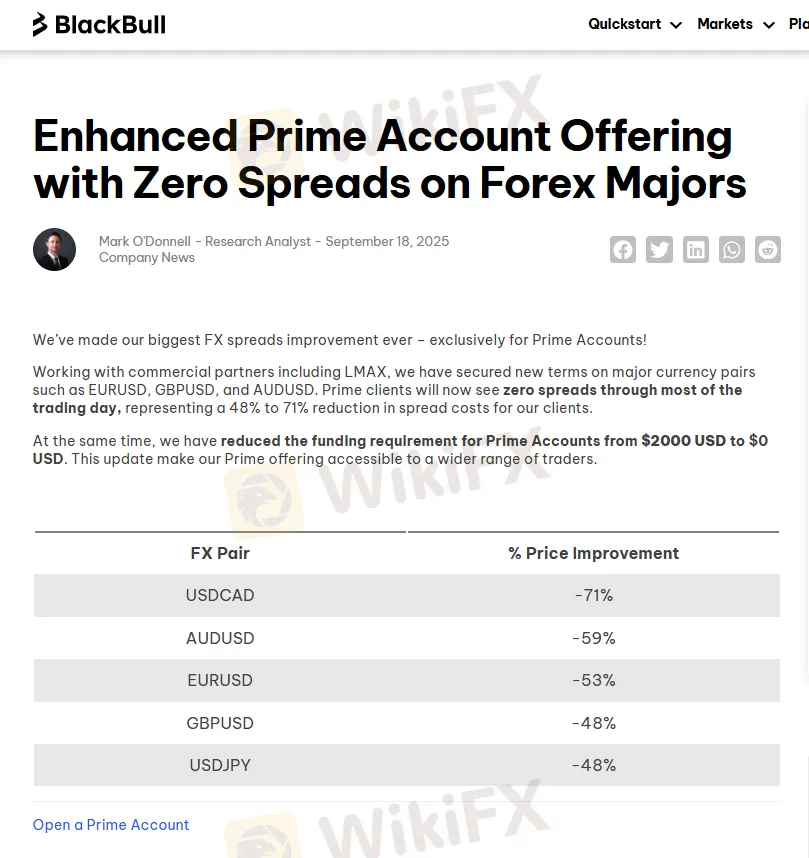BlackBull Enhanced Prime Account Zero Spreads Forex
Abstract:BlackBull Markets launches zero-spread trading on major FX pairs for Prime accounts, delivering up to 71% spread cost reduction through the LMAX partnership.

BlackBull Markets has eliminated spreads on major forex pairs for Prime account holders, marking the most significant pricing enhancement in the New Zealand-based broker's history. The enhancement, announced September 18, 2025, delivers zero spreads on key currency pairs including EURUSD, GBPUSD, and AUDUSD, throughout most trading hours.
Partnership Drives Zero-Spread Initiative
The breakthrough stems from BlackBull's strategic partnership with LMAX, a premier institutional liquidity provider known for transparent execution and deep FX pools. LMAX operates multiple global institutional exchanges with liquidity centers in London, New York, Tokyo, and Singapore, enabling BlackBull to access institutional-grade pricing previously reserved for major financial institutions.
Research Analyst Mark O'Donnell emphasized the magnitude of this development, noting that Prime clients now experience spread cost reductions ranging from 48% to 71% across major currency pairs. The most substantial improvement affects USDCAD trading, where spreads dropped by 71%, followed by AUDUSD at a 59% reduction.
Account Accessibility Transforms
BlackBull simultaneously eliminated the $2,000 USD minimum funding requirement for Prime accounts, reducing the barrier to $0 USD. This democratization allows broader trader access to institutional-level trading conditions previously restricted to high-net-worth clients.

The ECN broker, established in 2014 by Michael Walker and Selwyn Loekman, serves traders across 180+ countries through its Auckland headquarters. BlackBull maintains multi-regulatory compliance and operates with Electronic Communication Network execution, providing direct market access without dealing desk intervention.
Comprehensive Spread Reductions
The zero-spread implementation covers five major forex pairs, with specific percentage improvements clearly documented. USDJPY and GBPUSD both achieved 48% spread reductions, while EURUSD captured a 53% improvement. These enhancements apply throughout most trading sessions, maximizing cost savings for active forex traders.
BlackBull's infrastructure supports over 26,000 tradable instruments across forex, commodities, indices, and equities. The company operates multiple trading platforms, including MetaTrader 4, MetaTrader 5, cTrader, and TradingView, ensuring compatibility with diverse trading strategies.
Institutional Technology Foundation
LMAX's award-winning technology platform provides the backbone for BlackBull's enhanced offering. The liquidity provider operates FCA-regulated exchanges and maintains a commitment to the FX Global Code, ensuring transparent price discovery and firm execution without last-look rejections.
The partnership leverages LMAX's central limit order book system and peer-to-peer institutional liquidity pools, delivering consistent execution with minimal latency. This infrastructure enables BlackBull to pass institutional pricing advantages directly to retail Prime account holders.
Conclusion
BlackBull Markets' zero-spread initiative represents a significant shift in retail forex pricing, bringing institutional trading conditions to individual traders through strategic liquidity partnerships. The elimination of funding requirements further enhances accessibility, positioning BlackBull competitively in the evolving forex brokerage landscape.
Experience zero-spread trading on major forex pairs with a BlackBull Markets Prime account. Open your account today to access institutional-grade pricing with no minimum deposit requirement.

Read more

CySEC Warns Public of Four Unauthorised Investment Firms
CySEC alerts investors about four unlicensed investment firms operating without authorisation under Cyprus law.

MBFX Review: Withdrawal Denials, Fund Scams & Poor Customer Support Service
Is your MBFX withdrawal request pending even after months of raising it? Has the broker defrauded you? Does the broker keep changing spreads to pile losses for you? Have you lost due to its copy trading activities? Is the customer support service silent to your trading queries? Many traders have called out the broker for these alleged wrongdoings. In this MBFX review article, we have highlighted these trading concerns. Read on!

Headway Broker Regulation and User Reviews
Headway Broker review: FSCA license exceeded, unregulated claims, and 86+ user complaints.

Vida Markets Regulation and Broker Review
Vida Markets regulation exceeded under FSCA. Broker review covers accounts, platforms, and risk considerations.
WikiFX Broker
Latest News
The "Broker Group" Abyss: How OmegaPro Trapped Thousands in a Digital Dead End
FXORO Under the Microscope: Revoked Licenses and The "Advisory" Trap
XXLMARKETS Review: Regulatory Status and Trading Conditions
IUX Review 2025: Regulatory Status and Withdrawal Complaints
Saxo Bank Review 2025: Regulatory Status and Safety Score
AmariFX Review: Traders Annoyed by Slippage, Login & Withdrawal Issues
Libertex Investigation: When "Expert Advice" Leads to Total Ruin
EZINVEST Exposure: When a "Personal Advisor" Becomes Your Portfolio’s Worst Enemy
Deriv Review: Is This Popular Broker Legit or Risky?
Is CICC Broker Safe? CICC Regulation Check & In-Depth Review
Rate Calc

